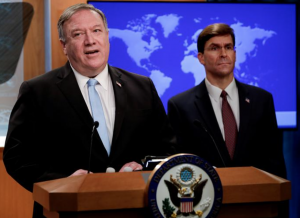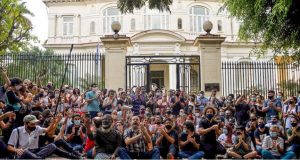By: Lauren Della Stua
Impunity Watch Staff Writer
WASHINGTON, D.C – Nearly 27 years after the terrorist attack at the Argentine Israeli Mutual Association (AMIA), the Inter-American Commission on Human Rights (IACHR) places responsibility on Argentina.

On July 18, 1994, Iranian backed Hezballah terrorists bombed the AMIA, killing 85 people and injuring over 300 people. The attack was followed by numerous warnings, as well as the 1992 suicide bombers attack on the Israeli Embassy in Argentina. Despite the attack taking place in Argentina, the bombing has been associated with accusations of Argentinian cover-ups. In 2004, suspects of the cover-up were found not guilty. Shortly after the federal judge overseeing the case, Juan Jose Galeano was removed from his position for his grave mishandling of the case.
In 2006, a new prosecutor, Alberto Nisman, was appointed to investigate the bombing and accused members of the Iranian Government and Hezbollah. Nisman also formally accused Christina Fernandez de Kirchner, former President of Argentina, of covering up Iran’s involvement in the attack. In 2015, hours before Nisman was going to testify against the President, he was murdered. Despite the lead prosecutor’s untimely murder, Kirchner is facing trial for treason based on her involvement in the cover-up.
In February 2019, the federal judge, Galeano, 2 prosecutors, a police commissioner, and several intelligence agency members were found guilty of covering up evidence and paying off witnesses in order to delay the case.
IACHR decided to investigate the alleged cover-up and divided its investigation into three parts: (1) Argentina’s investigation under the Federal Criminal and Correctional Court No. 9 from 1994-2005, (2) AMIA Attack Investigation Prosecution Unit (UFI AMIA) from 2005 to present, and (3) judicial cover-ups.
On March 25, 2021, following their investigation, the IACHR issued a Report on the Merits discussing Argentina’s responsibility and possible reparations. As to responsibility, IACHR noted that Argentina had a responsibility to adopt safety measures after they had knowledge of such a real threat. Furthermore, Argentina, although not necessarily willfully, declined to take protective measures of the Jewish community, and therefore violated of the right to equality and non-discrimination.
As to the Federal Criminal Court, IACHR concluded that the mishandling of evidence, forced hypothesis, and irregularities culminated to a cover-up. The second investigation, led by Nisman, uncovered more flaws of the Federal Criminal Court. For example, undue delays, improper handling of evidence, lack of expert testimony, and uncorroborated evidence. Furthermore, the State violated the right of the families to access information pertinent to the case by claiming it is classified. Lastly, the IACHR also found the State violated the right to psychological and moral integrity of the victims’ families by delaying and covering up the investigation.
The Merit Report gave 6 recommendations for the State. The recommendations included completing the investigation and punishing those responsible, paying reparations to the victim’s and their families, creating policies to manage the budget of the intelligence agencies, creating educational programs related to fighting terrorism, granting access to all information related to the case and investigation, and creating measures to prevent future attacks based on discrimination.
To this day, the terrorist attacks have not been fully investigated nor have the accused all been brought to justice. However, the Merit Report will hopefully shed light on the corruption and prevent future attacks on the minority communities.
For further information, please see:
AJC Global Voice – 25 Years since the AMIA Bombing: Hezbollah and Antisemitism – 17 July 2019
BBC News – Argentina prosecutor Alberto Nisman was killed, judge rules – 27 Dec. 2017
BBC News – Argentina Marks 1994 Bomb Attack – 18 July 2006
CNN News – Prosecutor in 1994 Buenos Aires Bombing Found Dead – 27 Dec. 2017



